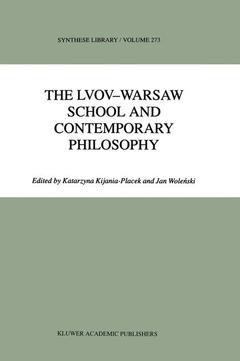Description
The Lvov-Warsaw School and Contemporary Philosophy, 1998
Synthese Library Series, Vol. 273
Coordinators: Kijania-Placek K., Wolenski Jan
Language: English
Subject for The Lvov-Warsaw School and Contemporary Philosophy:
Publication date: 10-2012
404 p. · 16x24 cm · Paperback
404 p. · 16x24 cm · Paperback
Description
/li>Contents
/li>
This collection celebrates the centenary of the Lvov--Warsaw school, established by Kazimierz Twardowski in Lvov in 1895. This school belongs to analytic philosophy and successfully worked in all branches of philosophy. The Warsaw school of logic became perhaps the most important part of Twardowski's heritage. Lesniewski, Lukasiewicz and Tarski, leading Polish logicians, achieved results which essentially influenced the development of contemporary logic. A close connection of logic and philosophy was a typical feature of the Lvov--Warsaw school. The papers included in the collection deal with all directions of research undertaken by Polish analytic philosophers. Special attention is paid to logic and comparisons with other philosophical movements, particularly with Brentanism, which was one of the sources of the Lvov--Warsaw school.
The Reception of the Lvov-Warsaw School.- I. History and Comparisons.- Twardowski’s Distinction Between Actions and Products.- On Ajdukiewicz’s Empirical Meaning-Rule and Wittgenstein’s Defining Criterion.- Inspirations and Controversies: From the Letters between K. Twardowski and A. Meinong.- The Lvov-Warsaw School — the First School of Non-positivist Scientific and Analytic Philosophy.- Women’s Contributions to the Achievements of the Lvov-Warsaw School: a Survey.- Truth-Bearers from Twardowski to Tarski.- Twardowski and Husserl on Wholes and Parts.- The Rationalistic Paradigm of Franz Brentano and Kazimierz Twardowski.- ?ukasiewicz’s Interpretation of Aristotle’s Concept of Possibility.- II. Le?niewski.- De Veritate: Another Chapter. The Bolzano-Le?niewski Connection.- Le?niewski’s Conception of Logic.- Non-elementary Exegesis of Twardowski’s Theory of Presentation.- On Some Essential Subsystems of Les?iewski’s Ontology and the Equivalence between the Singular Barbara and the Law of Leibniz in Ontology.- III. Philosophy of Language.- The Paradox of Grelling and Nelson Presented as a Veridical Observation Concerning Naming.- D?mbska, Quine and the So-called Empty Names.- Truth and Time.- The Postulate of Precision: Its Sense and Its Limits.- Polish Logic, Language and Philosophy of Language.- IV. Logic and the Foundations of Mathematics.- The Ajdukiewicz Calculus, Polish Notation and Hilbert-style Proofs.- Ja?kowski and Gentzen Approaches to Natural Deduction and Related Systems.- The Contribution of Polish Logicians to Recursion Theory.- Studying Incompleteness of Information: A Class of Information Logics.- V. Ontology, Epistemology, Philosophy of Science.- On ?ukasiewicz’s Theory of Probability.- On What There Is Not — a Vindicationof Reism.- On the Concept of a Subject of Cognition in Ajdukiewicz’s Philosophy.- Induction and Probability in the Lvov-Warsaw School.- ?ukasiewicz’s Logical Probability and a Puzzle about Conditionalization.- VI. Logic and Philosophy.- Truth as Consensus. A Logical Analysis.- The Lvov-Warsaw School and the Problem of a Logical Formalism for General Systems Theory.- From Closure-operatic Deductive Methodology to Non-standard Alternatives.- Forgotten and Neglected Solutions of Problems in Philosophical Logic.- Index of Names.
© 2024 LAVOISIER S.A.S.




